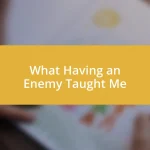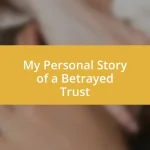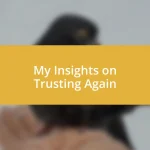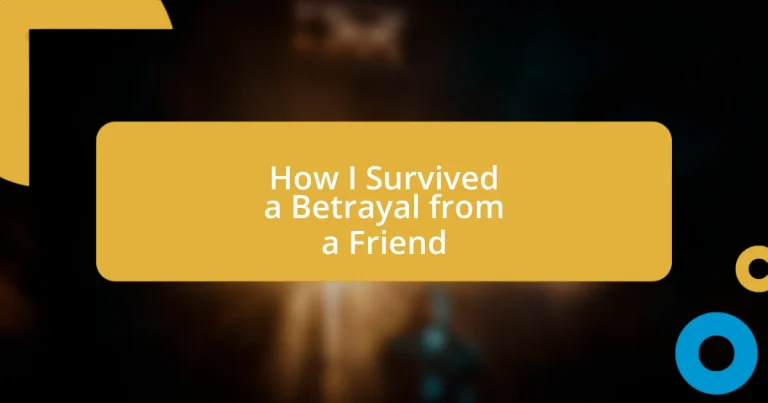Key takeaways:
- Understanding and coping with betrayal involves recognizing emotional pain, processing feelings, and employing coping strategies like journaling and establishing boundaries.
- Rebuilding trust requires transparency, mutual understanding, and setting clear expectations in new relationships, while being mindful of past experiences.
- Learning from betrayal leads to personal growth, leading to reassessing values in friendships, trusting intuition, and embracing resilience despite setbacks.
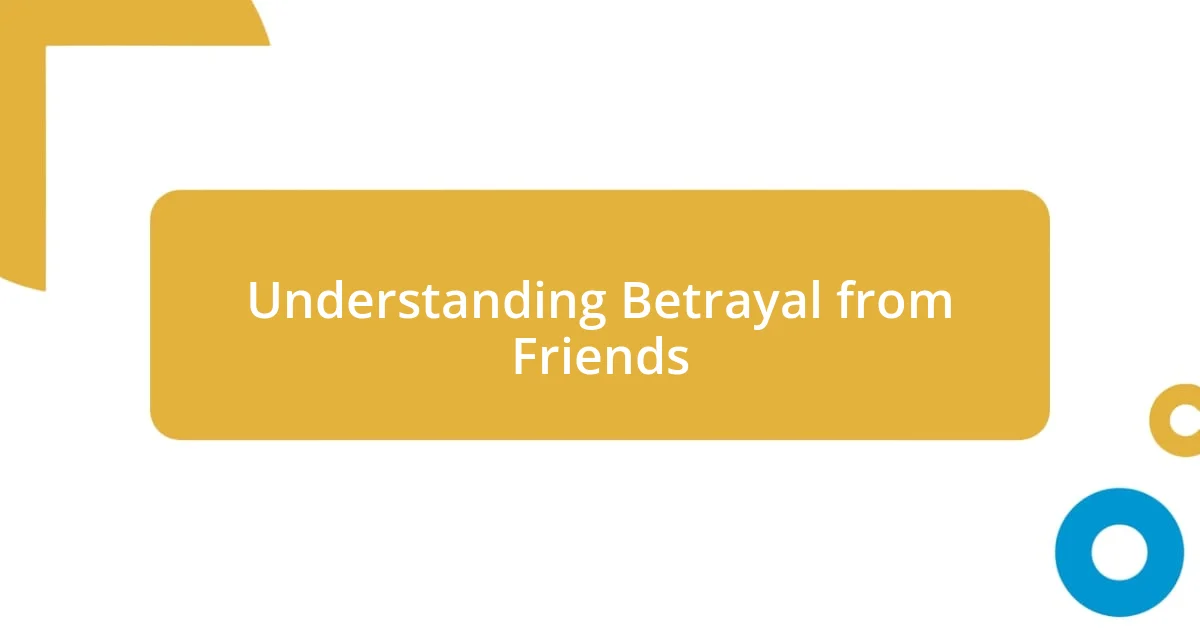
Understanding Betrayal from Friends
Betrayal from friends can hit us harder than we expect. I remember the moment I found out my closest friend had shared my secrets with others; it felt like a punch to the gut. How could someone I trusted so deeply turn my vulnerability into gossip?
The emotions that swirl during such moments are often overwhelming. It’s like a mix of confusion, anger, and heartache all rolled into one. I often asked myself, “What did I miss? Was there a sign?” These questions can keep us up at night, grappling with the realization that the person we thought we knew may not be who they claimed to be.
Understanding betrayal isn’t just about recognizing the act itself; it’s about comprehending the impact it leaves behind. It took time for me to process how betrayal altered my perspective on trust and friendship. I learned that it’s essential to heal and redefine relationships based on the lessons learned from such painful experiences.
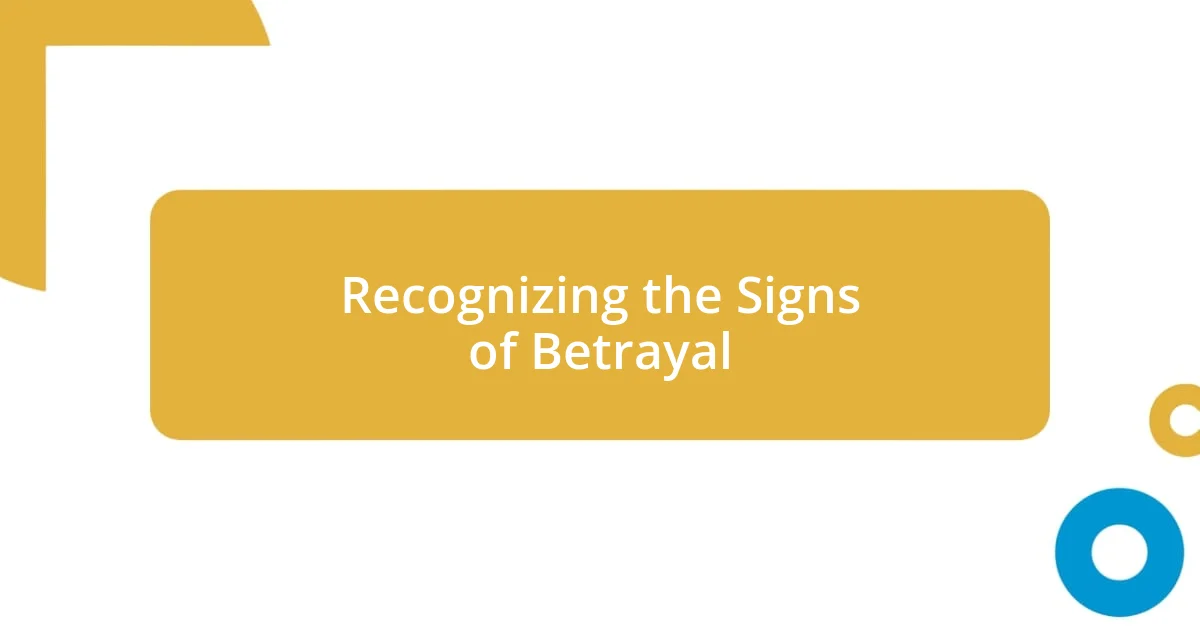
Recognizing the Signs of Betrayal
Recognizing the signs of betrayal can often feel like an uphill battle. I remember a time when I started noticing inconsistencies in my friend’s words and actions. They would make promises but then constantly find excuses for not following through. Those little red flags started adding up, leaving me feeling uneasy about our friendship.
It’s common for a friend to withdraw from sharing personal information or become less available. I found this true as my friend’s demeanor shifted; conversations felt one-sided, with them sharing less and avoiding eye contact. This change was subtle, but it planted seeds of doubt in my mind. I kept asking myself, “Is it me, or is there something more at play?”
To truly understand betrayal, we must be vigilant. Comparing how someone behaves under different circumstances can reveal a lot. When I noticed that certain friends would distance themselves or gossip when their words didn’t align with their actions, it made me realize the importance of trust and transparency in any relationship.
| Signs of Betrayal | Example Behaviors |
|---|---|
| Withdrawal | Less communication and engagement |
| Broken Promises | Consistently failing to keep commitments |
| Inconsistency | Contradicting words and actions |
| Gossip | Sharing personal information with others |
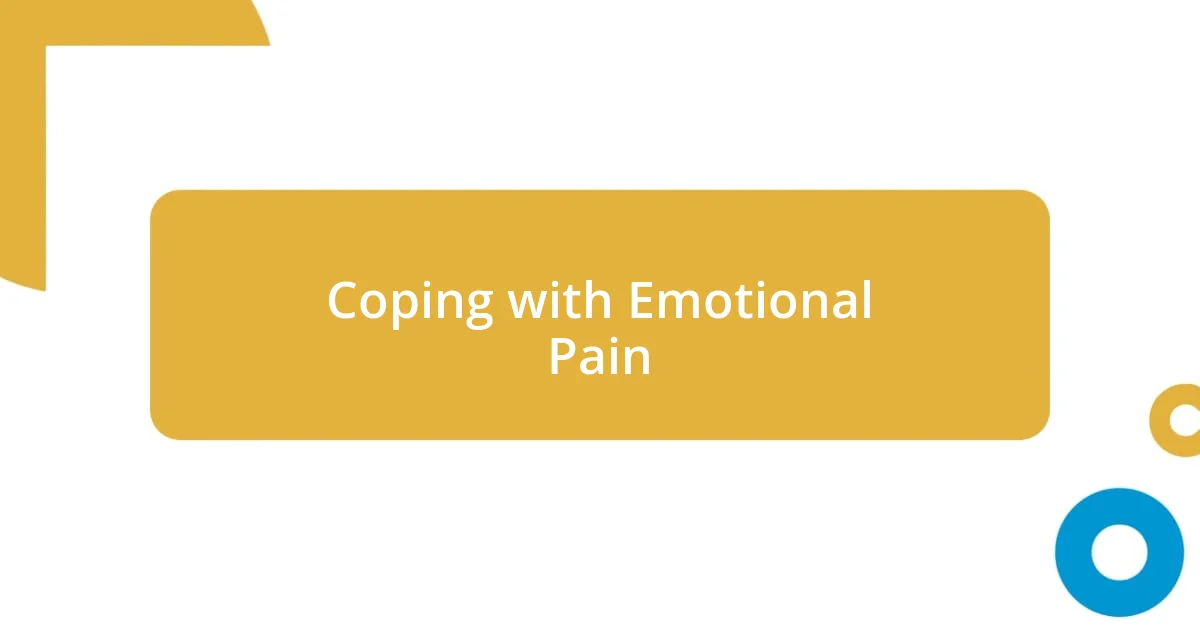
Coping with Emotional Pain
Coping with the emotional pain after betrayal is a deeply personal journey. In my experience, it often felt like wading through thick fog, where every step required immense effort. I turned to journaling as an outlet; writing down my feelings helped me navigate the chaos within. I realized that recognizing and validating my emotions allowed me to reclaim some sense of control over my narrative.
Here are some coping strategies that I found immensely helpful:
- Talk It Out: Find a trusted friend or therapist who can listen to your feelings without judgment.
- Establish Boundaries: Protect yourself from further pain by limiting contact with the person who hurt you.
- Engage in Self-Care: Focus on activities that uplift your spirit, whether it’s a hobby, exercise, or simple relaxation.
- Practice Mindfulness: Spend time being present, allowing your thoughts and feelings to surface without overwhelming you.
- Reflect: Analyze what this experience taught you about trust and how you want to move forward.
By embracing these practices, I began to confront my feelings head-on, which gradually lightened the emotional burden I carried. It’s important to remember that healing takes time and that you deserve that time to mend your heart.
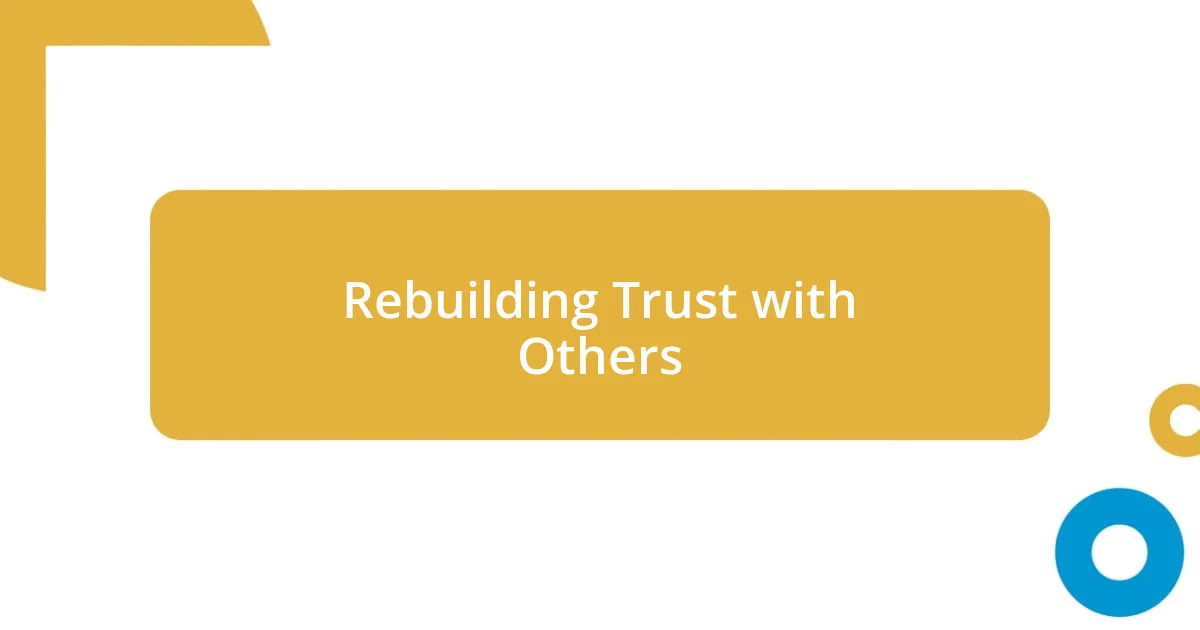
Rebuilding Trust with Others
Rebuilding trust with others can feel daunting, especially after a betrayal. I vividly recall a time when I began to open up again to new acquaintances. It was nerve-wracking, but I reminded myself that vulnerability is a strength. I started small, sharing a lighthearted story about my day and gauging their reactions. This initial step helped me understand that not everyone would hurt me.
Gradually, I learned the importance of transparency. I found that being honest about my feelings created a safe space for dialogue. During a conversation with a newfound friend, I confessed my fears of being betrayed again. To my surprise, they shared their own struggles with trust. This moment of reciprocity made me realize that many of us carry similar scars, and through mutual understanding, rebuilding trust becomes more achievable.
As I continued to navigate this journey, setting clear expectations emerged as crucial. I remember asking a close friend, “How can we ensure that we both respect our boundaries?” Their thoughtful response reinforced our connection and paved the way for a healthier friendship. Each positive interaction was like a small brick, slowly but surely reconstructing the foundation of trust.
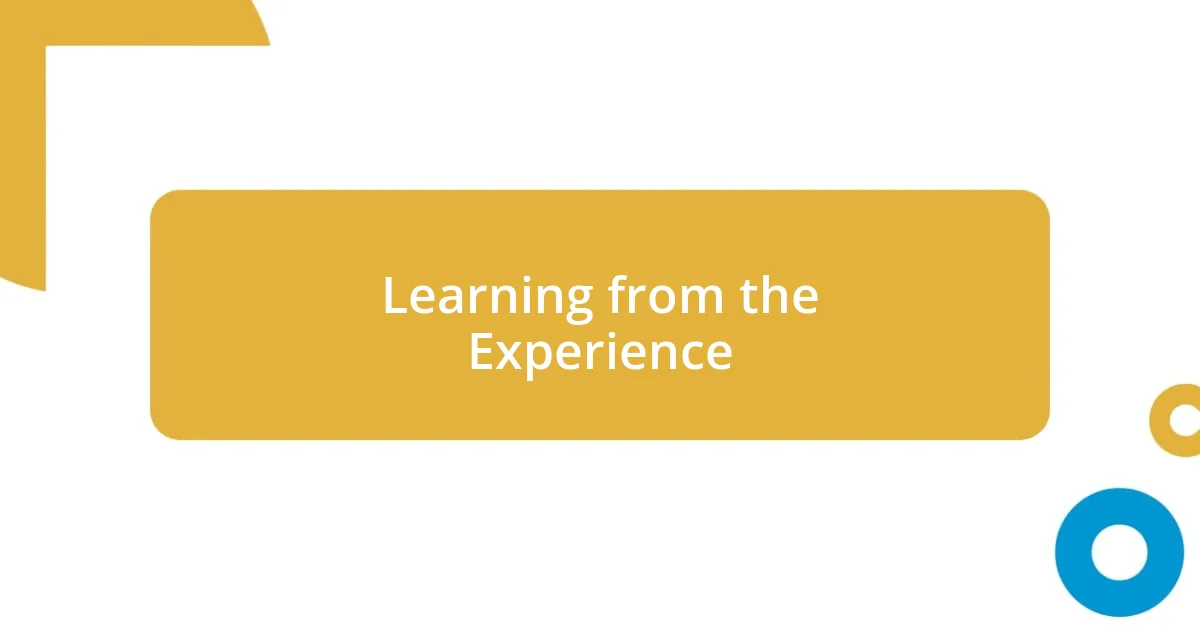
Learning from the Experience
Learning from betrayal can be a transformative experience, often pushing us to reassess our values and connections. I remember feeling profoundly hurt but, in hindsight, this pain became a catalyst for self-discovery. I began asking myself questions like, “What did I truly value in my friendships?” This introspection led me to define what genuine loyalty and support meant to me, helping me set higher standards for my relationships.
As I processed the betrayal, I noticed patterns in my past friendships that I hadn’t recognized before. I had a habit of overlooking red flags, thinking that I could maintain harmony at all costs. Reflecting on these moments made me realize the significance of intuition in friendships; now, I trust my gut feelings more than ever. I’ve learned that sometimes, our instincts signal when it’s time to step back or reevaluate our connections.
Each betrayal also highlighted the importance of resilience. After enduring the emotional storm, I found myself gradually rebuilding my resolve. I often think about a close friend who stood by me during this time; their unwavering support was a reminder that not everyone would betray my trust. Averse to being vulnerable at first, I learned that opening up to the right people could lead to deeper, more fruitful relationships. This experience taught me that every setback carries the potential for growth, and it’s our choice to embrace that potential.
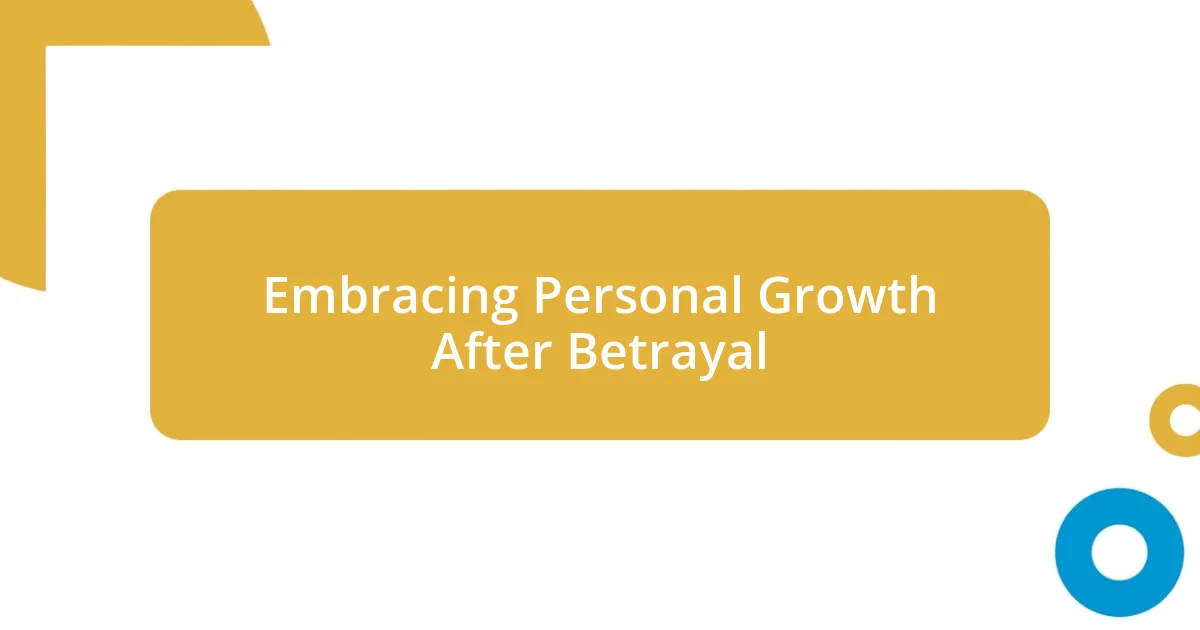
Embracing Personal Growth After Betrayal
Embracing personal growth after betrayal often requires a willingness to confront our emotions head-on. I remember sitting in a quiet café, feeling an overwhelming mix of anger and sadness wash over me. In that moment, I asked myself, “What can this pain teach me?” Embracing those raw feelings instead of burying them helped me navigate my healing process.
As I began to emerge from that emotional fog, I found solace in journaling. Writing became my therapy, a way to capture the lessons learned and to reflect on my journey. I often wrote entries like, “What qualities do I want in my next friendship?” This practice not only clarified my desires but also reminded me of my strength in overcoming adversity.
The path of personal growth is not always linear; it has its ups and downs. I often remind myself that it’s perfectly okay to take two steps forward and one step back. In these moments, I embraced the notion that growth is a journey, not a destination. When I felt overwhelmed, I’d ask, “Am I being too hard on myself?” This simple question allowed me to embrace patience and to appreciate the small victories along the way.

